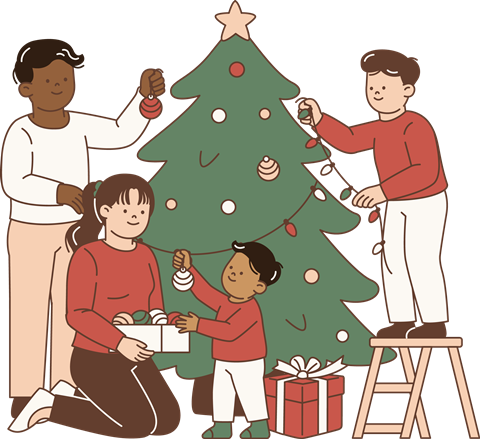Rhiannon Goulding shares her wisdom and experience on how to enjoy Christmas within a blended family

It’s that time of year again, the time of giving and celebrating. As Christians, we have reason to celebrate the birth of our King Jesus, who is the most amazing gift of all. Meanwhile, the world (whatever it believes) goes slightly mad in a frenzy of parties and gifts.
Before we lose ourselves in the joy of celebrations in church, and give in to the impulse to fling one more strand of tinsel on the Christmas tree, it’s a good idea to think about the variety of experience we bring to our celebrations.
I know lots of single people who cringe every year at the adverts on TV, which show perfect families, extended families, different generations together or even large groups of friends partying. They may not have all or any of those in their lives. I know people who would love to fill a stocking for a child but haven’t had the chance. I also know people estranged from family members.
So let’s rejoice together, but let’s also celebrate with care.
Approaching Christmas sensitively
Families like ours, which are blended and extended, don’t always find it easy to celebrate either Christmas or our own birthdays on ‘The Day’. Sometimes it’s another adult’s turn to have the children with them. Or maybe there’s some other reason why (with all the coming and going) we can’t get everybody’s diaries to match. We don’t make a big deal of it. We celebrate when we can all get together.
We have to be sensitive, too, to the fact that, however perfect we try to make our celebration, for some members of the family there may be a core of sadness in the happy times, because another parent can’t be there.
If I know this is likely to be the case, I make sure we have some conversations about it beforehand (not on the day). My two boys are adopted, but we understand that their wider family is bigger than just us. I have said to them: “I know on Christmas Day you might really miss other members of your family. If you’re feeling a bit sad, you can always come for a hug. Or we can have a code word you say so I know how you’re feeling. It’s OK to be sad sometimes.”
Our boys had so many dismal Christmases before they came to us that once they were with us, I was tempted to compensate. I wanted them to know just how good Christmas could be, and why, as Christians, we celebrated it. However, I was given some wise advice when we started fostering: “Beige is better.”
Some children can feel overwhelmed by too much giving. If they aren’t used to new clothes, parties, gifts and people making a fuss of them, they don’t know how to respond. The social worker who helped us learn about fostering said: “Don’t give them too much, too soon. Sometimes just having a quiet dinner with the family is enough.” When you’ve had so very little, even things we think are a bit beige and ordinary are actually special.
We also had a child who didn’t know how to receive a gift. He’d never been given anything of his own, let alone something that he liked or wanted. He might run out of the room or hide behind the sofa, or throw the new toy on the floor.
Usually I helped him to practise beforehand. We talked about how to take the present and look at the giver and say “Thank you”. We discussed how to unwrap it and to sit down and play with it. In fact, very often he couldn’t bring himself to play with it straightaway, but he learned to put it on to one side rather than throwing it back at them. It was more about helping him understand what it was like to receive a gift and how to react, because he’d never had that experience when he was growing up.
He was a child for whom one toy at a time was as much as he could handle. It was a good lesson in how not to go over the top with our giving for all our children.
Some children can feel overwhelmed by too much giving
If you’ve got a blended family, there may be too much of everything. If the children are moving back and forth between two houses, with two bedrooms, two Christmas trees, two lots of gifts, it can become overwhelming. Or there may be a stark contrast between the two situations, the surroundings or the way they’re treated. A lot depends on your relationships with the other family, but it’s worth keeping in mind.
Our words matter
One thing I’m always cautious about is how we refer to ourselves. I don’t look round the table and say how lovely it is to have ‘all the family’ together. I may have all my family there at that point, but the children don’t have all of theirs. In fact, the word ‘family’ can sometimes be problematic on its own. Nowadays I tend to say “In this house we do this” rather than “In this family”. If the children are moving between different families, with different ways of doing things, they can feel excluded if they don’t seem to know the code. I don’t want them to feel that they don’t belong.
When we have extended or blended families, there are a lot of things to take into consideration if we’re going to find a way of celebrating well together.
Jesus loved a party. God loves us to celebrate his goodness. Let’s be sure that we celebrate with care and sensitivity, so that everyone we include in our festivities feels accepted and loved.

































No comments yet